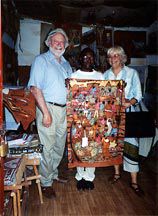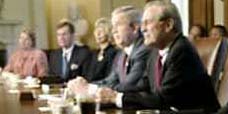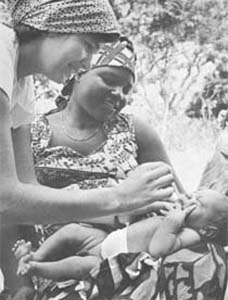January 1, 2005: Headlines: COS - Kenya: Return to our Country of Service - Kenya: Emory University: In 1961 Ronald Schuchard joined Teachers for East Africa (TEA), a USAID-funded precursor to the Peace Corps, which provided teachers for secondary schools in Kenya, Uganda, and Tanganyika
Peace Corps Online:
Peace Corps News:
Library:
Peace Corps: Return to our Country of Service :
Peace Corps Volunteers Return to our Country of Service:
January 1, 2005: Headlines: COS - Kenya: Return to our Country of Service - Kenya: Emory University: In 1961 Ronald Schuchard joined Teachers for East Africa (TEA), a USAID-funded precursor to the Peace Corps, which provided teachers for secondary schools in Kenya, Uganda, and Tanganyika
In 1961 Ronald Schuchard joined Teachers for East Africa (TEA), a USAID-funded precursor to the Peace Corps, which provided teachers for secondary schools in Kenya, Uganda, and Tanganyika

In 1961 Ronald Schuchard joined Teachers for East Africa (TEA), a USAID-funded precursor to the Peace Corps, which provided teachers for secondary schools in Kenya, Uganda, and Tanganyika
Ron Schuchard Returns to His Teaching Roots in Kenya
In June, Goodrich C. White professor of English Ronald Schuchard revisited Kenya - and his youth - when he once again answered a call that had beckoned him to East Africa over forty years ago.
The year was 1961: on a bitter cold inaugural morning in Washington D.C., President John F. Kennedy challenged a new generation to fight "tyranny, poverty, disease, and war." Schuchard, then an undergraduate at the University of Texas at Austin, was one of the first to rise to that challenge. Later that year, he graduated; he married; and the new couple joined Teachers for East Africa (TEA), a USAID-funded precursor to the Peace Corps, which provided teachers for secondary schools in Kenya, Uganda, and Tanganyika (now Tanzania) on the eve of those nations' independence from the British.
"The British were only providing primary education," Schuchard said. "Prior to independence the governments established their own secondary schools, but they didn't have teachers. We were there to fill the void until African teachers could be trained."
Ron and Keith Schuchard spent three years teaching at the all-boys Meru School, situated on the northeast corner of Mt. Kenya. Along with an international staff, Schuchard taught English, biology, chemistry, and physics, as well as serving as the games master. He built a court for basketball, a game which at the time no Kenyan had heard of, and which the Oxford-trained headmaster objected to as "not a gentleman's sport." Every year there was a production of Shakespeare; each boy memorized the entire play and could act every part. "Those boys worked really hard," Schuchard said with obvious admiration. "Many of them would read the encyclopedia in their spare time. Nearly all of those students received fellowships to continue their studies in Europe."
Now flash forward four decades, to 2001, and Schuchard has been teaching at Emory for 32 years; Kenya has suffered under the corruption of Daniel Moi, Uganda under the dictatorship of Idi Amin; and forty former TEA volunteers locate each other in cyberspace and plan a reunion in D.C. "At that reunion, we decided to go back to East Africa - to return in our sixties to the countries where education had suffered so much," Schuchard said.
This past June the group landed in Kampala, Uganda, where they began an extensive tour through Uganda, Kenya, and Tanzania, meeting with ministers of education, teachers, principals, and U.S. diplomats to discuss the state of education in those three nations. They visited numerous secondary schools, including the Meru School where the Schuchards had taught. The basketball court had become a permanent fixture; the chemistry lab remained unchanged; the teachers were now all African. "They cancelled half a day of school for our visit," Schuchard said. "And many of the students we had taught came back for the reunion. Many of them are now prominent in Kenyan society, including a Minister of Health and the treasurer of the Kenyan Athletic Association."
"We visited the classrooms in which we had taught and saw the plight. The school was in an anti-Moi area, so they had received no funding. (The Schuchards' former students were leaders in the reform movement that led in 2002 to free and democratic elections which have given new hope to Kenya).There were two computers for seven hundred students, and they are not good enough to support educational software. There are five microscopes for thirty students to share at one time. The Encyclopedia Britannica that my wife and I brought in 1962 is still the only one they have."
The Schuchards have made a pledge to provide annual teacher and student awards and tuition support for the Meru School. Schuchard also is currently looking into the possibility of sending recycled Emory computers to the schools, and sending Emory students and staff to install them on an alternative spring break or summer program. "When you see how basic are the needs that would greatly improve the educational program, you see how easily you could help make a difference," he said.
When this story was posted in February 2005, this was on the front page of PCOL:
 | The Peace Corps Library
Peace Corps Online is proud to announce that the Peace Corps Library is now available online. With over 30,000 index entries in over 500 categories, this is the largest collection of Peace Corps related reference material in the world. From Acting to Zucchini, you can use the Main Index to find hundreds of stories about RPCVs who have your same interests, who served in your Country of Service, or who serve in your state. |
 | Make a call for the Peace Corps
PCOL is a strong supporter of the NPCA's National Day of Action and encourages every RPCV to spend ten minutes on Tuesday, March 1 making a call to your Representatives and ask them to support President Bush's budget proposal of $345 Million to expand the Peace Corps. Take our Poll: Click here to take our poll. We'll send out a reminder and have more details early next week. |
 | Peace Corps Calendar:Tempest in a Teapot?
Bulgarian writer Ognyan Georgiev has written a story which has made the front page of the newspaper "Telegraf" criticizing the photo selection for his country in the 2005 "Peace Corps Calendar" published by RPCVs of Madison, Wisconsin. RPCV Betsy Sergeant Snow, who submitted the photograph for the calendar, has published her reply. Read the stories and leave your comments. |
 | WWII participants became RPCVs
Read about two RPCVs who participated in World War II in very different ways long before there was a Peace Corps. Retired Rear Adm. Francis J. Thomas (RPCV Fiji), a decorated hero of the Japanese attack on Pearl Harbor, died Friday, Jan. 21, 2005 at 100. Mary Smeltzer (RPCV Botswana), 89, followed her Japanese students into WWII internment camps. We honor both RPCVs for their service. |
 | Bush's FY06 Budget for the Peace Corps
The White House is proposing $345 Million for the Peace Corps for FY06 - a $27.7 Million (8.7%) increase that would allow at least two new posts and maintain the existing number of volunteers at approximately 7,700. Bush's 2002 proposal to double the Peace Corps to 14,000 volunteers appears to have been forgotten. The proposed budget still needs to be approved by Congress. |
 | RPCVs mobilize support for Countries of Service
RPCV Groups mobilize to support their Countries of Service. Over 200 RPCVS have already applied to the Crisis Corps to provide Tsunami Recovery aid, RPCVs have written a letter urging President Bush and Congress to aid Democracy in Ukraine, and RPCVs are writing NBC about a recent episode of the "West Wing" and asking them to get their facts right about Turkey. |
 | Ask Not
As our country prepares for the inauguration of a President, we remember one of the greatest speeches of the 20th century and how his words inspired us. "And so, my fellow Americans: ask not what your country can do for you--ask what you can do for your country. My fellow citizens of the world: ask not what America will do for you, but what together we can do for the freedom of man." |
Read the stories and leave your comments.

Some postings on Peace Corps Online are provided to the individual members of this group without permission of the copyright owner for the non-profit purposes of criticism, comment, education, scholarship, and research under the "Fair Use" provisions of U.S. Government copyright laws and they may not be distributed further without permission of the copyright owner. Peace Corps Online does not vouch for the accuracy of the content of the postings, which is the sole responsibility of the copyright holder.
Story Source: Emory University
This story has been posted in the following forums: : Headlines; COS - Kenya; Return to our Country of Service - Kenya
PCOL17386
95
.










